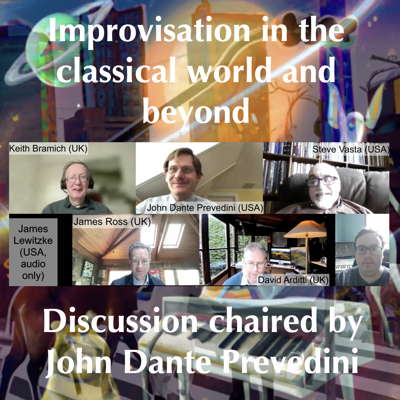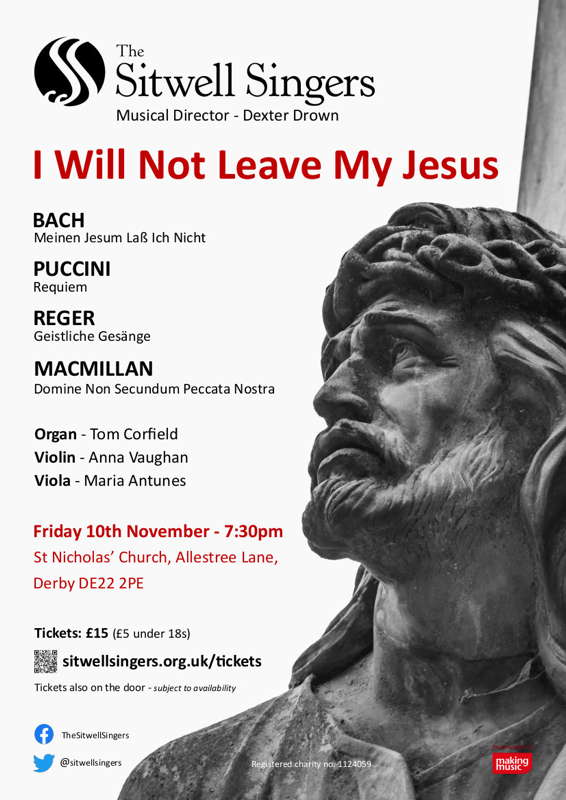 ASK ALICE: Weekly, from 2003 until 2016/17, Alice McVeigh took on the role of classical music's agony aunt to answer questions on a surprising variety of subjects.
ASK ALICE: Weekly, from 2003 until 2016/17, Alice McVeigh took on the role of classical music's agony aunt to answer questions on a surprising variety of subjects.
 DISCUSSION: John Dante Prevedini leads a discussion about Improvisation in the classical world and beyond, including contributions from David Arditti, James Lewitzke, James Ross and Steve Vasta.
DISCUSSION: John Dante Prevedini leads a discussion about Improvisation in the classical world and beyond, including contributions from David Arditti, James Lewitzke, James Ross and Steve Vasta.
- Evelyne Berezovsky
- Rite of Spring
- George Perle
- Nicholas Sharratt
- Anthony Caesar
- Easter
- Leonard Slatkin
- Howard Shelley
Splendidly Thought-out
MIKE WHEELER listens to music by J S Bach, Howells, MacMillan, Puccini, Reger, Sibelius and Vaughan Williams from the Sitwell Singers and friends
The Sitwell Singers and conductor Dexter Drown were joined by violinist Anna Vaughan, viola-player Maria Antunes and organist Tom Corfield for a programme ingeniously structured around two main strands: the one-hundred-and-fiftieth anniversary of the birth of Max Reger, and the Lutheran choral 'Meinen Jesum lass ich nicht' (I will not leave - or, as Dexter Drown suggested in his spoken introduction, let go of - my Jesus), which gave its title to the whole concert - St Nicholas' Church, Derby, UK, 10 November 2023.
Reger was represented by, among other things, four of his Eight Spiritual Songs, Op 138. As the choir processed in, Tom Corfield played Johann Ludwig Krebs' Prelude on the concert's eponymous chorale, making it dance. The first of the Reger pieces, Der Mensch lebt und bestehet eine kleine Zeit (Humanity lives and endures only a short while) received a measured performance, emphasising its somewhat Brahmsian character.

Poster for the Sitwell Singers' 10 November 2023 concert
Other Reger pieces were scattered throughout the evening. Choir and conductor brought out the chorale-like nature of Nachtlied (Night song), while, at the start of the second half, the singers assembled at the back of the church for Unser lieben Frauen Traum (Our Lady's dream), then came forward, dividing into two groups lined up along the side-walls, for Das Agnus Dei (The Lamb of God). This would have worked even better for Der Mensch lebt, the one piece from Op 138 that is scored for double choir, and I wonder why the opportunity was not taken.
The concert ended with two more Reger pieces, not from Op 138. O Tod, wie bitter bist du (O Death, how bitter you are) sets the same text as the third of Brahms' Four Serious Songs. The opening shows Reger at his knottiest, but a stark unison passage leads to the calmer second verse, a contrast well conveyed here. Finally it was back to the evening's presiding chorale, and the single-movement chorale-cantata Reger based on it, with bouyant string-playing from Anna Vaughan and Maria Antunes. The affirmative ending was particularly well brought off.
The chorale was also represented by the opening and closing movements of J S Bach's Cantata No 124, which ended the first half, the chorale melody firmly declaimed. In Puccini's Requiem, setting just the opening few lines of the Catholic Requiem mass text, the choir's sound opened out effectively from the withdrawn beginning.
James MacMillan's Domine non secundum peccata nostra (Lord, not according to our sins ...) was the big centre-piece of Part 2, combining syllabic choral chanting with freer-floating lines, marked by the kind of melodic flicks I tend to associate more with John Tavener. The gradual change in mood as the penitential text gains confidence was well-handled, while Anna Vaughan was superb in the often flamboyant violin obbligato, particularly the unaccompanied links between the choral sections.
She and Maria Antunes also made individual contributions to the evening, sympathetically supported by Tom Corfield. Vaughan Williams' Romance for violin is no mere off-cut from The Lark Ascending, and the unquiet undercurrent was touched in just enough, as was the degree of calm it reaches at the end. Herbert Howells' Elegy for viola got the searching performance it needs, recalling the unsettled Vaughan Williams of the 1940s. Vaughan and Antunes also paired up in Sibelius's Duo, one of the large number of chamber works he composed in the 1880s and early 90s. They captured its graceful, gently moody character, with its hints of the mature composer to come skilfully touched in.
If I have a reservation about the evening overall, it's that the mood was rather unvarying. But it was a splendidly thought-out piece of programming, and the performances carried real conviction.
Copyright © 28 November 2023
Mike Wheeler,
Derby UK



